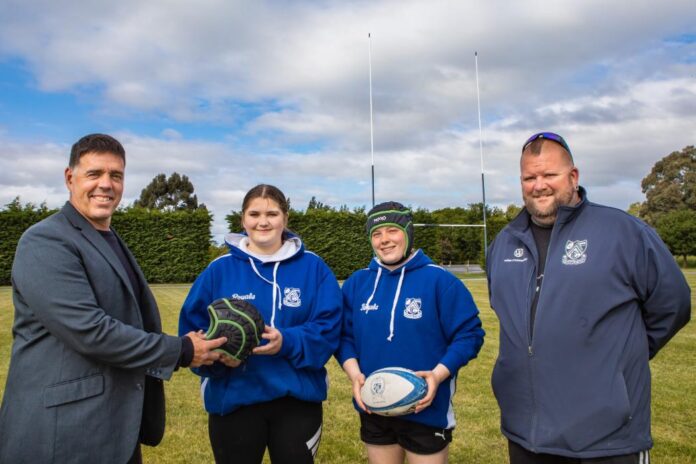Source: University of Canterbury
29 November 2021
Young female rugby players will join a world-leading trial to find out whether headgear can help prevent collision-related injuries on the field.
-
University of Canterbury Professor Nick Draper (left) is inviting players from the Prebbleton Rugby Football Club Senior Girls’ team to join his study into the effects of collisions in the sport. Team members Izzy Scovell and Hanna Alsop (in headgear) are keen to be involved and have the support of Head Coach Kevin Scovell.
The two-year Canterbury study, which will kick off in next year’s rugby season amid growing concern about health and safety in the sport, originally involved two teams of male junior rugby players at the Waihora Rugby Club in Tai Tapu, with funding from the Canterbury Medical Research Foundation.
However, lead researcher University of Canterbury (UC) Education, Health and Human Development Professor Nick Draper, has received $120,000 in additional funding from the Neurological Foundation allowing him to widen the study to include more than 20 female players from the Prebbleton Rugby Football Club Under-17 Senior Girls’ team.
The study is aimed at finding out whether World Rugby-approved protective headgear can reduce impacts during on the field collisions. It also explores the possible health consequences of collisions on young brains.
Professor Draper, who is an experienced junior rugby coach and a father of three young rugby-playing sons, says it’s important that young women are included because previous research suggests females are more at risk from concussion.
“It’s a really important population to study and we’re very grateful to the Neurological Foundation for providing this funding for us. I think what we’re doing now will be world-leading in terms of collecting data on young male and female players and being able to compare the results.”
He says there are likely to be significant differences between male and female rugby players beyond factors such as players’ size and running speed, so having female participants will provide valuable information.
Professor Draper says there is rising concern from parents and the rugby union community about the health risks associated with head collisions.
“I think as researchers, and as a university, we have a responsibility to the community to find ways to make the game safer for our children.
“Three-quarters of our active rugby players are juniors, so developing a deeper understanding of collisions in rugby is a really important area of research.”
Neurological Society Head of Research Dr Sarah Schonberger says Professor Draper’s project is timely and will provide significant data for concussion research and healthcare.
“As we see growing evidence from adult contact sport that head injuries increase the risk of neurological disorders, we want to do everything we can to make sport safer and reduce the risk of our athletes experiencing these disorders in the future.
“We are really excited to not only be supporting a study in young people, but young female athletes. This is an area where research is desperately needed. If we know the effects of head impacts on both males and females from a young age, we have the greatest chance of protecting them from neurological disorders in the future.”
Prebbleton Rugby Football Club Senior Girls’ Head Coach Kevin Scovell says the players are keen to be involved. “It’s a great study to be part of because concussion is such an important issue. It will also mean that we’re one of the most well-looked after teams in the union. The Club fully supports this research and has allowed us to go ahead with it.”
Players taking part in the University of Canterbury study can choose whether they want to take part wearing World Rugby approved NPro headgear, or without headgear. They will also wear special mouthguards equipped with sensors to measure peak accelerations that occur during collisions at training and in matches. Collision events, which will also be videoed, will be recreated in the laboratory to assess their impact.
The trials will try to accurately assess the number and size of collisions in rugby and find out if wearing World Rugby approved headgear can reduce ‘peak acceleration’ collision forces.
MRI scans will be carried out on the player pre-season, post-season and after any concussive collision as part of the research. Supported with a grant from Pacific Radiology, the scans will help detect any changes in the brain as a result of collisions.



